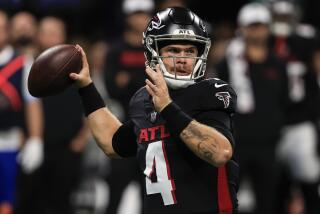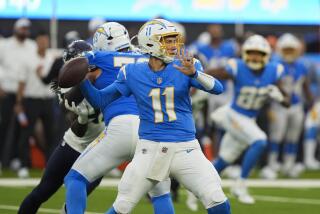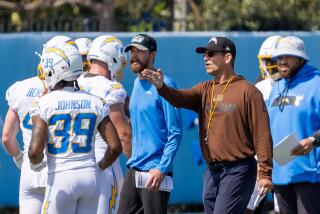THE NFL DRAFT : CHARGERS : Beathard Has a 5 Up Sleeve, but What Else?
SAN DIEGO — Bobby Beathard, the Chargers’ general manager, finds himself in such an unusual position today that he almost doesn’t know how to act.
Beathard has a first-round pick in the NFL draft--and likely will use it.
The last time he did that was in 1983, when he was the general manager of the Washington Redskins. He selected cornerback Darrell Green with the final pick of the round. This time, the pick is the fifth overall, a lofty position Beathard never enjoyed with the Redskins.
“I’ve never been here before,” Beathard said. “I’m not sure what to do.”
That is one reason, Beathard said, that he is speaking so freely about the available players. And he has made no secret about his interest in offensive tackle Richmond Webb of Texas A&M.;
Webb appears to be what the Chargers need to help rebuild their offensive line. At 6-feet-6, 290 pounds, he could step in and play immediately. Beathard has said he clearly is the best offensive lineman in the draft.
“He is a tough guy to pass up,” Beathard said.
Maybe Beathard is speaking this openly because the pick appears too good to be true. But late-changing events could alter his plans.
Beathard has become all but convinced that Tampa Bay will select linebacker Keith McCants of Alabama with the fourth pick. Combine that with a possible late trade between New England and Seattle that would allow the Seahawks to move up and take Miami defensive tackle Cortez Kennedy third, and the Chargers could be looking at linebacker Junior Seau of USC and Oceanside High School.
Beathard might then take Seau, who could help at inside linebacker, and worry about filling the offensive line needs later.
This, of course, is if the New York Jets do not upset the modified scenario by taking someone other than running back Blair Thomas of Penn State with the second choice.
“I really don’t know what’s going to happen,” Beathard said.
He is not alone. The draft is a guessing man’s game. And Beathard has a reputation of being one of its shrewd players.
He has a history of being active and creative on draft day. Last-minute deals, mid-round deals, trading a first-round choice for later picks, swapping a high pick next year for a lower one this year, trading players for picks--he can conjure up just about anything.
But this year, he’s saying it could get mighty boring around Charger headquarters, especially if they hold onto their current picks. After the first round, the Chargers do not have another choice until the third. They have three picks there, the first of which is 57th overall, acquired from Tampa Bay in the deal for running back Gary Anderson.
“It might be kind of a dull day,” Beathard said. “It’s a long time between the fifth pick and the third round. Maybe something will happen, but right now, I can’t think of a way to make it happen.”
But those who have watched Beathard doubt today will be any different than the past.
“Don’t worry, he’ll do some trading,” said Bruce Allen, a Phoenix-based agent whose father is former Redskin Coach George Allen.
Beathard has been saying for weeks that he would like to trade his No. 1 pick for a slot later in the first round, with the idea of picking up another choice in the bargain. The Chargers would prefer that it be something in the second round, where they are without a pick because of the trade with Chicago for quarterback Jim McMahon.
But as the draft has drawn closer, Beathard has said he is beginning to accept the fact that he might not be able to swing such a deal. Beathard lately has labeled the chances of making it happen as “50-50” at best.
That could change quickly if any of the four teams ahead of the Chargers in the first round do other than what Beathard expects. His dream might be to have Kennedy left on the board when the Chargers pick. Several teams close behind them have said that they like Kennedy, including Detroit, which has the seventh pick, and Seattle (Nos. 8 and 10).
Beathard said he likes Kennedy, too, but might be willing to trade him for the right price and a spot close enough to the top to take Webb--if that is who he really wants.
One other scenario could have the Chargers using a first-round choice to fill what Beathard said is their other most glaring need--cornerback.
The options there appear to be as limited as they are at offensive line. Beathard said this is not a strong year for cornerbacks, either.
The best may be J.D. Williams of Fresno State, whose sprinter’s speed is attractive. But some scouts wonder if he has coverage ability to match. The next best choice might be Ben Smith of Georgia. The Chargers worked Smith out on Monday, but that might have been more as a contingency in case they move well back into the first round.
Another backup plan could have the Chargers taking one of several other highly regarded linebackers, including James Francis of Baylor and Chris Singleton of Arizona State.
But Beathard has said these scenarios are unlikely, because he does not want to trade back to further than the 10th pick overall.
And while attention might be focused on Round 1, the Chargers have plenty of other business to take care of over the next two days.
They have 14 choices in the 12-round draft, including three selections in both the third and seventh rounds.
Beathard has identified several other areas the team would like to address as wide receiver, tight end and return specialist. About the only position Beathard has said he would not draft would be a kicker.
Charger Notes
Rod Bernstine, the Chargers’ first-round choice in 1987, has changed positions again. A tight end as a rookie, an H-back last season, Bernstine has been moved to running back, General Manager Bobby Beathard said. Beathard said that Coach Dan Henning said he thought he could make more use of Bernstine as a runner. Bernstine, who has missed part of each of his first three seasons because of injuries--the most serious of which required reconstructive knee surgery in December 1988--was a fullback during his first two seasons at Texas A&M.; Last season as an H-back, Bernstine gained 137 yards on 15 carries, an average of 9.1 yards, before being injured in the fifth game against Denver and later undergoing arthroscopic knee surgery.
CHARGER PICKS, THOSE THEY TRADED Round, Pick: Acquired From, Sent To: Rd. 1, Fifth Overall: Chargers retain their own 1990 pick
Rd. 2, 33rd Overall: To Chicago for QB Jim McMahon, Aug. 18, 1989
Rd. 3A, 57th Overall: From Tampa Bay for RB Gary Anderson, April 21, 1990
Rd. 3B, 60th Overall: Chargers retain their own 1990 pick
Rd. 3C, 67th Overall: From Indianapolis for OLB Chip Banks, Oct. 17, 1989
Rd. 4, 89th Overall: To Raiders for RB Napoleon McCallum, Aug. 11, 1988
Rd. 5, 116th Overall: To Dallas for RB Darrin Nelson, Oct. 17, 1989
Rd. 6, 145th Overall: Chargers retain their own 1990 pick
Rd. 7A, 172nd Overall: Chargers retain their own 1990 pick
Rd. 7B, 185th Overall: From Cleveland for RB Barry Redden, Sept. 3, 1989
Rd. 7C, 187th Overall: From Washington for P Ralf Mojsiejenko, Aug. 29, 1989
Rd. 7D, 193rd Overall: From San Francisco for WR Wes Chandler, June 2, 1988
Rd. 8, 201st Overall: Chargers retain their own 1990 pick
Rd. 9, 227th Overall: Chargers retain their own 1990 pick
Rd. 10, 256th Overall: Chargers retain their own 1990 pick
Rd. 11, 283rd Overall: Chargers retain their own 1990 pick
Rd. 12A, 311th Overall: To Indianapolis for CB Leonard Coleman, July 8, 1988
Rd. 12B, 326th Overall: From Washington for 1989 12th-round pick, April 24, 1989


